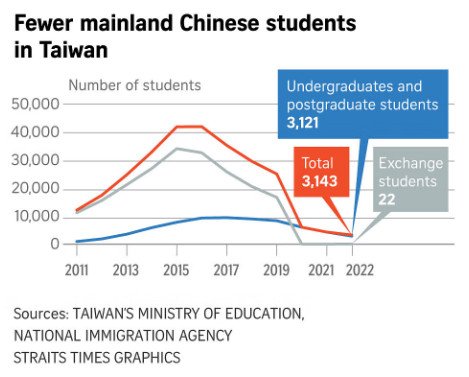July 13, 2023
SINGAPORE – The last cohort of bachelor’s degree students from China have just graduated in Taiwan – and there is none to replace them in the new school year in August.
This comes as Beijing is yet to lift a 2020 ban on its students enrolling in new degree programmes in Taiwan universities, when it cited considerations over Covid-19 as well as cross-strait relations.
It is a reality which students and experts say only breeds further misunderstanding and bias between people on both sides of the Taiwan Strait.
Today, with only short-term students and existing students moving up to postgraduate programmes remaining, the number of Chinese students in Taiwan is estimated to be a record low of around 2,000. This is down from 25,049 in 2019 before the pandemic.
“Many young Taiwanese are naturally hostile towards China, especially since the implementation of the National Security Law in Hong Kong (in 2020),” said Mr Li Gongqin, vice-president of Shih Hsin University in Taipei, which used to see up to 800 mainland Chinese students in a year.
“But from what I’ve seen, communicating with Chinese students often helps these young people see things from another perspective, even if they may not agree,” he said, adding that the “competitive nature” of Chinese students also pushes their Taiwanese counterparts to work harder.
The ban does not apply to existing Chinese students in Taiwan, who are allowed to complete their degrees and stay on to pursue next-level studies.
Exchange students pursuing short-term programmes are also not affected.
But with no new degree students arriving on the island, the total number of Chinese students has declined sharply.
There are no restrictions on Taiwanese students enrolling in Chinese universities. According to Chinese state media, there are around 12,000 Taiwanese studying in China.
“Cross-strait educational exchanges are asymmetrical right now, which is a huge pity for both sides,” said Professor Tso Chen-dong, a National Taiwan University political scientist.
“Communication should always go both ways. We’ve lost an important avenue for Taiwanese students to understand their Chinese counterparts here – and vice versa.”
That is something deeply felt by Abby (not her real name), a fresh Chinese graduate who completed her bachelor’s degree in humanities at Feng Chia University in central Taiwan in June.
Over the past four years, she has experienced her fair share of discrimination, she said.
Some Taiwanese would give her a look sideways as soon as they heard her accent, and on her social media accounts, she received taunts demanding that she “return to China”.
But she has also formed many close friendships with her Taiwanese classmates, said the 22-year-old, who declined to give her real name over privacy concerns.
“The good experiences far outweigh the bad ones. If anything, more Chinese students should come to Taiwan so that we can better understand one another.”
Chinese students were first allowed to study in Taiwan in 2011 under President Ma Ying-jeou of the Beijing-friendly party Kuomintang.
During that year, 12,155 Chinese students arrived in Taiwan. While there were degree-level students, the vast majority were short-term students who had signed up for exchange programmes lasting one or two semesters.
The total figure reached a peak of 41,975 in 2016 before falling progressively thereafter – the same year that President Tsai Ing-wen of the independence-leaning Democratic Progressive Party (DPP) was elected.
Within months of her taking office, Beijing slashed the admissions quota for new Chinese undergraduate students in Taiwan to 1,000 for the 2017 school year, down from 2,136 a year earlier.
It was seen as among several moves which Beijing had aimed at the Tsai administration over her failure to endorse the concept of a single Chinese nation.

At a press conference in January 2023, Mr Ma Xiaoguang, a spokesman for Beijing’s Taiwan Affairs Office, blamed the Tsai administration for the situation.
“Since the DPP came to power, it has almost destroyed the development of peaceful cross-strait relations,” he said.
“The turbulent waves of Taiwan independence have permeated Taiwan’s campuses, which is discouraging for Chinese parents and students. If there are no Chinese students in Taiwan, it’s obvious who’s responsible.”
Taiwan’s Mainland Affairs Council refuted the accusations.
In response to queries from The Straits Times, it said that it has “repeatedly” called on Beijing to lift its ban and allow students to enrol in Taiwanese universities.
“By doing so, young mainland Chinese friends would be able to experience Taiwan’s free academic atmosphere and its pluralistic and democratic society, which would be conducive to positive interactions between the two sides of the strait,” the council said.
But it is precisely such freedom in Taiwan that has the Chinese authorities worried, said political scientist Sung Kuo-chen from Taipei’s National Chengchi University.
“China has political concerns – it is afraid that their students will see Taiwan’s progress and true democratic way of life, which is unlike how the place is presented in their propaganda,” he said.
Abby, the graduate, said that it is not uncommon for Chinese nationalists to describe Taiwan as economically and socially backward on social media back home.
“Obviously, after coming here, I found that to be far from the truth. Taiwanese people are very knowledgeable about politics and society,” she added, noting that one of her favourite pastimes is watching Taiwanese political debate talk shows on television.
Other Chinese students like Ms Wang Huizi avoid discussing politics with their Taiwanese classmates altogether.
“Cross-strait relations are so tense now, so I think it’s better if we don’t go there,” said the 25-year-old Ningbo native, who is pursuing a PhD in communications at Shih Hsin University in Taipei.
She has been studying here since enrolling for a bachelor’s degree in 2016, and enjoys spending weekends at Taiwan’s indie designer markets.
“Taiwanese people are very friendly and polite, and I would highly recommend any of my Chinese friends to come and study here too, once they are allowed to,” she said.


